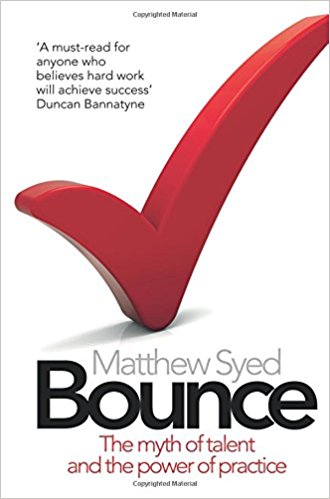Bounce Summary
6 min read ⌚
 The Myth of Talent and the Power of Practice
The Myth of Talent and the Power of Practice
Talent is overrated – and never enough! And if you really want to succeed in anything in life, you’ll have to repeat this truism as if a mantra. And pair it up with another: practice makes perfect, practice makes perfect, practice makes perfect…
Or at least that’s what Matthew Syed arguments so forcefully about in “Bounce.”
Who Should Read “Bounce”? And Why?
If you think that you’re not talented about something – chances are you won’t become anyone important in that something. But not because you couldn’t have – merely because you have missed the point and spend too little time practicing.
“Bounce” is a book specifically written for – and about – you. It analyzes genius performances in fields as different as sports, music and math, so as to prove to you that talent is a myth. And that you need to start practicing right away!
About Matthew Syed
 Matthew Syed is a British journalist and fairly successful former table tennis player, becoming English champion on four separate occasions and being its top ranked player for nearly ten years.
Matthew Syed is a British journalist and fairly successful former table tennis player, becoming English champion on four separate occasions and being its top ranked player for nearly ten years.
He has been working for “The Times” during the past two decades. During the same period, he has published two books: “Bounce” and “Black Box Thinking.”
“Bounce Summary”
The original subtitle of “Bounce” may be even more interesting than the one you can see on its cover above: “Mozart, Federer, Picasso, Beckham, and the Science of Success.”
Now, you have to agree: not many books can put such names next to each other and walk away from it unscathed.
“Bounce” can – since it’s neither about music nor about football, neither about tennis nor about art. It’s about talent.
Or, better yet, the lack of it.
Really!
As far as Syed is concerned – and he was England’s top ranked table-tennis player for a decade – Mozart and Federer, Picasso and Beckham have no talent whatsoever. What they do have – is a dedicated will and at least 10,000 practiced hours!
Take Mozart for example. He may be the archetypal prodigy. After all, he was a brilliant musical performer by the age of 6. And at that age, can’t even differentiate a musical quarter note from a poorly drawn shovel!
So, you can’t tell us that Mozart wasn’t a genius!
Well, Syed can! And he has none other than Malcolm Gladwell to back him!
You see, you’re making a terrible mistake when you compare Mozart to other six-year-olds. You should instead compare him to other people who have practiced about 3,500 hours. Because that’s exactly how much time Mozart had spent in front of his piano by the time he was six!
In other words, that’s about two years of 5-hour day-to-day practice!
The only thing you spent so much time on before you were 6 was, maybe, picking your nose. And – let’s face it! – you were pretty good at it!
However, it’s one thing to be good at something, and a completely different thing to be the best one!
And the difference between the best and the good is not only in the amount of time they spend practicing, but also the way they test themselves after they don’t need to anymore!
Because once you reach a certain level – say, the level of your peers – you usually stop challenging yourself. High-level performers know better: they keep inventing new obstacles and beat them. They’re in a league of their own from the start!
And Matthew Syed was able to learn this best from a direct competitor: Desmond Douglas. Even though tests proved that he was one of the table-tennis players with the slowest reaction times, he was lightning fast on the field!
How?
Well, because, he trained his brain to be perfect for table tennis! Namely, to select only the information relevant to the game; after all, he didn’t need to be able to react fast when someone threw food at him. Douglas mastered something sociologists call deliberate practice.
However, this requires so much effort that only those with proper motivation will ever be able to succeed.
And, sometimes, motivation is a strange thing. For example, there are many Brazilian soccer greats, mainly because there were always many before them! If you don’t believe that, take for example the phenomenon of female K-golfers dominating the sport. Until 1998, when Se-ri Pak became the first South Korean golfer to win the U.S. Women’s Open – there was basically none!
But, now – they have the proper motivation to succeed!
And that’s enough!
OK – that and about constant six-year-long 5-hours a day deliberate practice!
Key Lessons from “Bounce”
1. Mozart Wasn’t a Prodigy: He Just Practiced a Lot
2. You Need Motivation to Succeed – and Sometimes It Can Be Something Trivial
3. Learn How Not to Choke Under Pressure
Mozart Wasn’t a Prodigy: He Just Practiced a Lot
It sounds like a blasphemy, but, according to Matthew Syed – it’s true: Mozart was just a regular child! We think of him as someone extraordinary – that is: a child prodigy – because we compare him to the wrong group of people.
Namely, children!
However, Mozart was a child only in terms of age. In terms of musical proficiency – he was an adult. That is – someone who has practiced playing the piano for more than 3,500 hours!
Now, get this:
If you compare him to someone twice his age who has spent the same amount of time practicing – his technique isn’t all exceptional!
Talent is overrated! Practice can’t be!
You Need Motivation to Succeed – and Sometimes It Can Be Something Trivial
Mozart was able to be so good not merely because he spent so much time practicing – but because he found the motivation to do this!
Most of us can’t find any motivation for well, anything but building Lego castles – when we’re children! When we get older, our success depends on it.
Different things motivate different people, but the best part of it is – some of them are even trivial. For example, for Mia Hamm, that something was her coach telling her to “switch on.” For South Korean female golfers, it was Se-ri Pak winning the U.S. Open at the age of 20.
And for undergraduates in a simple experiment – it was sharing the birthday with someone who had successfully solved the assignment they were about to!
Just make yourself believe that you can do it!
And you’ll do it!
Learn How Not to Choke Under Pressure
However, don’t go overboard: too much confidence results in less practice and a bigger chance for a failure at a later stage. That’s what happens to many of the overexposed Mozarts of today!
And there’s a similar process which happens to those who lack confidence. Put in the words of Irving Blitzer: they choke!
How?
Well, your brain constantly works on two levels: implicitly and explicitly. The former is the automated way of doing things, the latter the conscious effort. Deliberate practice makes mental processes move from your explicit to your implicit brain.
However, pressure and lack of confidence move them back! And that doesn’t help at all!
Fortunately, there’s an easy solution: just say to yourself that it’s not a big deal!
It won’t be!
Like this summary? We’d like to invite you to download our free 12 min app, for more amazing summaries and audiobooks.
“Bounce” Quotes
Lowering standards just leads to poorly educated students who feel entitled to easy work and lavish praise. Share on X Child prodigies amaze us because we compare them not with other performers who have practiced for the same length of time, but with children of the same age who have not dedicated their lives in the same way. Share on X Had the six-year-old Mozart been compared with musicians who had clocked up 3,500 hours of practice, rather than with other children of the same age, he would not have seemed exceptional at all. Share on X It is only by starting at an unusually young age and by practicing with such ferocious devotion that it is possible to accumulate ten thousand hours while still in adolescence. Far from being an exception to the ten-thousand-hour rule,… Share on X It is often said that in elite sport the margins of victory and defeat are measured in milliseconds: the reality is that they are measured in variables that are far more elusive. Share on XOur Critical Review
Well-structured and even better written, “Bounce” by Matthew Syed basically reads for itself. True, in terms of theory, there’s nothing new in it. In fact, its basic idea – the now-ubiquitous “10,000 hours of practice” mantra – is much more wittily and fully explained in Malcolm Gladwell’s “Outliers.”
However, “Bounce” makes up for it in terms of applicability. It’s much more instructive. It may even become your “Bible” – especially if you’re a sportsman.
Emir is the Head of Marketing at 12min. In his spare time, he loves to meditate and play soccer.


 The Myth of Talent and the Power of Practice
The Myth of Talent and the Power of Practice 




